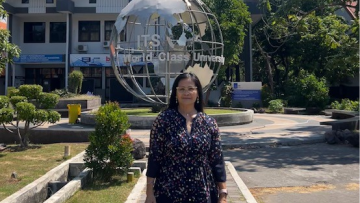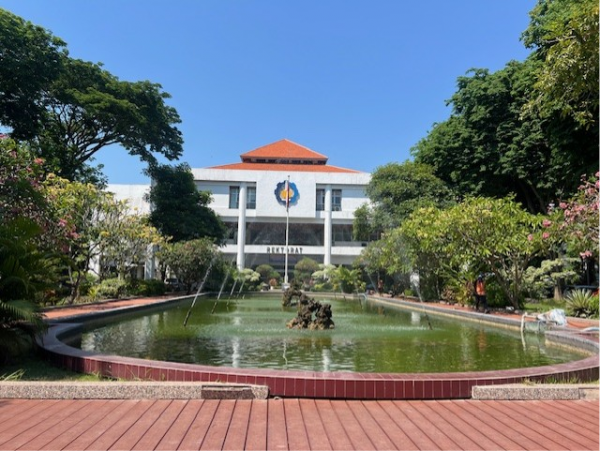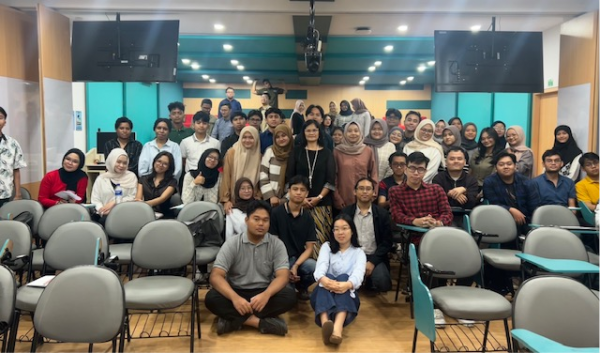Visit and Teacher Exchange in Surabaya, Indonesia 19.09-30.09.2025

I was at Institut Teknologi Sepuluh Nopember (ITS) in Surabaya, Indonesia, as a teacher exchange. The teacher exchange is a part of Erasmus+ Global Teacher Exchange. The exchange aimed to strengthen academic collaboration, enrich the teaching and learning experience for students in both institutions, and explore opportunities for sustainable partnerships in education, research, and mobility.
ITS is situated in Surabaya, the capital city of East Java. Surabaya is a metropolitan city and it is the second largest city in Indonesia with a population of approximately 3 million. ITS is one of Indonesia’s leading universities (https://www.its.ac.id/about-its). ITS is the third-best public university in Indonesia and ranks first in digitalization. The campus area is huge, with three different locations. There are about eight faculties and a multidisciplinary school, offering nearly 100 different programs with approximately 20,400 undergraduates and graduates, as well as 2,500 postgraduates.

The teacher exchange program was hosted by the Department of Business Management. The department is part of the Faculty of Creative Design and Digital Business. It offers undergraduate and graduate programs. The curriculum consists of areas in entrepreneurship, strategic management, finance, marketing, operations, and human resources. International Undergraduate Program (IUP) in Business Management is conducted in English, and it has many exchange students from all over the world.
Teaching and Student Engagement
I started my visit with presentations and discussions with representatives from ITS. This initial meeting laid the groundwork for the upcoming academic sessions, aligning objectives and ensuring that the lectures would integrate both Finnish and Indonesian perspectives. The preparatory activities also included cultural aspects such as getting to know Surabaya and its history.
From Monday, 22 September onwards, I delivered a series of lectures to both bachelor’s and master’s students across several courses.
- Entrepreneurial Marketing (master’s level) introduced advanced concepts of digital business and entrepreneurial thinking to approximately 20 graduate students.
- Sustainable Service Management (bachelor’s level, 90 students) emphasized the importance of sustainability in modern business practices.
- Ethical Leadership and Decision-Making (bachelor’s level, 50 students) explored the role of corporate ethics and corporate social responsibility in shaping responsible organizations.
- Strategic HR Staffing (bachelor’s level, 70 students) focused on forecasting and planning for international staffing needs in a globalized economy.
- Circular Business Economy (Industrial and Systems Engineering students) examined innovative approaches to sustainable economic development and resource efficiency.

The lectures combined interactive discussions, case studies, and real-world comparisons between Finland and Indonesia. Students responded enthusiastically, engaging in debates about circular economy, sustainability, leadership, and digital transformation.
Cultural Exchange and Collaboration
Beyond teaching, cultural immersion was an integral part of the program. On Tuesday, 23 September, I was asked to present “The Finnish education system, culture, and society “. The objective of the lectures was to gain deeper insights into “The Nordic model of education”. Participants of the hybrid workshop were different students and guests from ITS’s partner universities abroad and representatives from different embassies in Jakarta.
Faculty presentations and meetings with Business Management and Industrial and System Engineering Department (DTSI) further opened opportunities for research cooperation, joint projects, and exchange programs in fields such as entrepreneurship, circular business economy, digital business, and sustainable management.
The schedule also included social and cultural activities, getting to know the campus areas, and dinner on Wednesday evening with all invited guest lecturers from all over the world who participated in GLS (Guest Lectures Series), which is organized annually by ITS. While the planned Bromo trip (hiking tour to Mount Bromo) was replaced by a city tour, the experiences nonetheless enriched the cultural understanding and economic situation of both countries in global markets.
Mobility Teacher Exchange in Surabaya
A central achievement of this visit was the successful implementation of the mobility teacher exchange program and discussion with faculty members regarding the continuation of teachers and student engagement from both universities in 2026. Through this initiative, students and academic staff from Novia University of Applied Sciences can engage with ITS faculty and students, creating a platform for mutual learning. The exchange emphasized not only the transfer of knowledge in specific subjects but also the development of intercultural teaching competencies, pedagogical innovation, and cross-institutional dialogue.
This exchange highlighted the importance of mobility in higher education: enabling teachers to broaden their global perspectives, share best practices, and build bridges between different educational systems. In Surabaya, the program served as a pilot model for future exchanges, strengthening the institutional relationship and laying the foundation for reciprocal visits of ITS faculty to Novia.
Conclusion
The program demonstrated the value of combining academic lectures with cultural and institutional exchanges. Students benefited from international perspectives embedded in their coursework, while faculty on both sides identified areas for collaboration in curriculum development, research, and mobility initiatives. I do hope that the teacher exchange program with ITS will grow into a more structured mobility framework, potentially including student exchanges, joint courses, and collaborative research projects.
The Surabaya visit was not only an academic teaching mission but also a meaningful teacher mobility exchange that fostered deeper understanding and collaboration between Finland and Indonesia. By combining high-quality teaching with cultural exchange and faculty networking, the program strengthened academic ties and provided a platform for future international cooperation.
I thank Novia UAS and EU Erasmus+ Global for this opportunity.
Reseskildringen har godkänts för publicering av Novias redaktionsråd 28.10.2025.
ISSN: 2670-028X
![]()
Reseskildringen har publicerats i Novias publikationsserie RS: Reseskildringar. Inläggen har godkänts av Novias redaktionsråd.
Novia Publikation och produktion, serie RS: Reseskildring, ISSN: 2670-028X
Vi följer CC_BY 4.0 om inget annat nämns.